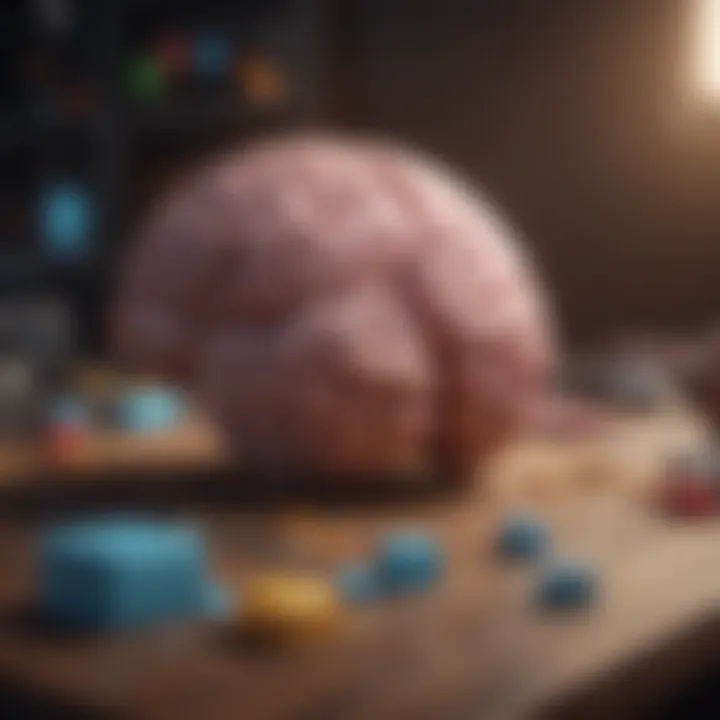Maximizing Cognitive Potential with Memory Games


Intro
In our fast-paced world, memory plays a pivotal role in guiding our daily lives. The ability to recall information swiftly and accurately can lead to personal achievements and professional success. Yet, as we juggle multiple responsibilities, our memory might not get the workout it needs. This brings us to an intriguing solution: brain memory improvement games.
These games offer not just entertainment but also a practical way to enhance cognitive function. By engaging with various types of brain games—from word puzzles to strategy games—individuals can experience a remarkable boost in memory recall and retention. This article aims to explore the impact of these games on the brain, backed by scientific insights, while offering strategies for integrating them into your routine effectively.
The idea here is to bridge the gap between fun and function, showing you how these games can be more than just a pastime; they're an avenue for growth in your cognitive abilities. Let’s plunge into the heart of this topic, starting with how we can leverage time management techniques in conjunction with memory-improving games, aiding in a structured approach to honing our mental faculties.
Time Management Techniques
Getting the most out of memory games requires a bit of strategy—not just in gameplay but also in how we manage our time. Engaging in brain games at the right moments can multiply their effectiveness. Here are several key techniques:
Prioritization Methods
Not all hours are created equal when it comes to cognitive function. Some individuals may find their minds sharper in the morning, while others hit their peak later in the day. The trick here is to identify and prioritize these windows of opportunity for playing memory games. Focusing on the most engaging and challenging games during these golden hours boosts retention and learning. A simple way to set your priorities could be:
- Identify peak focus times.
- Schedule memory game sessions during these times.
- Keep a strategic balance between different game types to prevent fatigue.
Task Scheduling Strategies
Creating a schedule that incorporates memory games into your daily routine can make a world of difference. Using tools like Google Calendar or even a classic planner helps set aside time for your cognitive training. Remember to be flexible! Some days will be busier than others, so if you miss a session, don’t sweat it—just adjust accordingly. Useful scheduling tips include:
- Block out specific times for game sessions—treat them like important appointments.
- Rotate game types to keep the interest alive—mix it up with puzzles, quizzes, or strategy games.
- Incorporate short sessions of 10-15 minutes, which are often easier to fit into tight schedules.
Procrastination Prevention Tips
Sometimes, we put off self-improvement tasks, even when they’re enjoyable. Taking simple steps can help avoid procrastination:
- Set clear, achievable goals for each gaming session.
- Find a gaming buddy to motivate one another.
- Use techniques like the Pomodoro method—play for 25 minutes, then take a 5-minute break to keep things fresh.
Integrating memory games into your routine requires thoughtful planning and discipline. But the payoff is substantial: sharper memory skills that can enhance both personal and professional pursuits. As we look deeper into the vast universe of brain games, let’s also explore personal development insights, showcasing how cognitive training melds with goal setting and mindfulness.
Foreword to Brain Memory Improvement Games
In the hustle and bustle of our daily lives, memory often takes a backseat. Yet, enhancing our cognitive abilities can be not just beneficial, but vital. This article shines a light on brain memory improvement games—tools crafted to bolster our memory and sharpen our mental faculties. Such games offer more than mere entertainment; they provide a structured way to engage our minds actively. By incorporating these games into daily practices, individuals can experience noticeable improvements in their cognitive performance. Not only does this lead to better memory retention, but it also nurtures overall mental health.
Understanding Memory and Its Importance
To comprehend the significance of memory improvement games, one must first grasp the essence of memory itself. Memory is not solely a mental storage system, but the very framework that allows us to form experiences, learn, and navigate life. It empowers us to remember people's names, recall vital information during a meeting, or even jog our memories about pleasant past experiences. The brain operates intricately, with different types of memory, such as short-term and long-term recall.
Memory affects every aspect of our lives. When it wanes, it results in frustration and a sense of inadequacy. This underscores why enhancing memory should be a priority. For busy professionals, parents, or students, improved memory means better performance at work or school and an overall enriched quality of life.
The Concept of Memory Improvement Games


Memory improvement games are designed specifically to target various cognitive skills. These games offer a delightful blend of challenge and fun, making the enhancement of memory feel less like work and more like play. Ranging from digital apps to traditional card games, the options are plentiful and diverse.
"Brain games can be your mental gym—where every challenge is a step toward a stronger mind."
These games tap into different aspects of cognitive functioning, helping players not just remember better but also think more critically. Whether it's matching pairs, solving puzzles, or recalling sequences, the methods of engagement vary widely. The key benefit is the active participation they require, which aids in forging stronger connections within the brain. Through regular practice, players can enhance their short-term memory, improve focus, and even foster better problem-solving skills.
As we explore these captivating games, it's important to recognize that their impact extends beyond mere amusement. Instead, they serve as companions in our cognitive journeys, ensuring that our minds stay agile and ready for whatever life throws our way.
Types of Memory Improvement Games
Exploring the world of memory improvement games unveils various types that cater to different cognitive needs. Each category offers unique approaches to memory enhancement, from stimulating brain functions to offering enjoyable ways of learning. Choosing the right type can have significant implications on how effectively one boosts their memory. It’s not just playing; it’s about engaging the brain in diverse tasks that challenge its capacity to remember. Hence, understanding these categories helps individuals select games that resonate with their personal goals and cognitive needs.
Cognitive-Based Games
Cognitive-based games typically aim to enhance specific brain functions, which can include memory, attention, problem-solving, and processing speed. They usually employ a variety of formats, from simple card-matching games to more intricate brain teasers that require fast decision-making and critical thinking.
These games often offer scored outcomes and levels of difficulty, providing players a benchmark for progress. For example, an interesting game called Lumosity features exercises tailored to measure and improve different aspects of cognitive function. Reflecting on the cognitive focus, these games challenge players to access different sections of their memory, thus promoting neuroplasticity — the brain's ability to adapt.
Puzzle Games
Puzzle games are a staple in the realm of memory improvement. They require players to think critically and often involve arranging pieces, solving algorithms, or identifying patterns. Popular examples include Sudoku, crosswords, and jigsaw puzzles.
Engaging with these games has shown to enhance visual-spatial reasoning and memory retention. Research suggests that regular participation in puzzle-solving activities can decrease the risk of cognitive decline with age. Moreover, puzzle games often act as a social engagement tool, inviting family or friends to join in, thus combining both cognitive and social benefits.
Strategy Games
Strategy games push players to think several moves ahead, integrating planning and foresight into the gameplay. Chess, for instance, is one of the most recognized strategy games that not only treasures memory but also emphasizes strategic thinking. Players must remember past moves while anticipating future ones from their opponent’s perspective.
Such games encourage users to engage in deep thought and reflection, creating mental pathways that fortify memory skills in the process. Playing strategy games regularly has been linked to improved concentration and understanding of relationships among concepts, making them invaluable in enhancing cognitive function.
Educational and Brain Training Apps
The digital world has gifted us with an array of educational and brain training apps that are more accessible than traditional games. Apps like Brain Age and Peak serve as vibrant platforms for enhancing memory skills. They typically offer various exercises aimed at improving different cognitive functions while leveraging gamification to keep users engaged.
Using mobile apps, individuals can personalize their training regimens with ease and updates based on performance metrics. This adaptability allows players to target specific areas for improvement while fitting their activities into busy schedules. The distinctiveness of these apps also lies in their ability to integrate learning with fun, proving beneficial for students, professionals, and busy parents alike. The concise feedback delivered by these platforms encourages continuous learning and progress evaluation.
Scientific Basis of Brain Games and Memory Enhancement
Understanding the scientific backing for brain memory improvement games is pivotal. The relationship between these games and cognitive function is not just a modern-day trend but a field ripe for exploration. Memory is a crucial element of our daily lives, influencing everything from learning new skills to retaining important information. This section will dissect the motivation behind utilizing these games for enhancing memory by illustrating the cognitive benefits they provide and presenting research that underpins their effectiveness.
Cognitive Benefits of Games
Engaging in memory improvement games offers numerous cognitive advantages. These activities stimulate various areas of the brain, promoting enhanced connectivity among neurons. When one plays these games, they often engage in mental exercises that challenge their existing knowledge while concurrently introducing new concepts. Here are some key benefits that arise from these interactions:
- Increased Neuroplasticity: The brain has an astounding ability to reorganize itself by forming new neural connections. With regular play, individuals can enhance their brain's adaptability, making it easier to learn and solve problems.
- Enhanced Attention and Focus: Many games require players to maintain their concentration for extended periods. This practice can translate into improved attention spans in everyday tasks, which is invaluable for busy professionals juggling multiple responsibilities.
- Improved Memory Retention: Games often facilitate the use of mnemonic devices and other memory techniques within their play. This not only aids in short-term recollection but also strengthens long-term memory retention.


In short, the cognitive benefits of these games extend beyond mere amusement. They foster a unique environment for learning and personal growth.
Studies Supporting Effectiveness
The effectiveness of brain games in enhancing cognitive function is backed by various scientific studies. For instance, research published in journals like Nature and Psychological Science have demonstrated clear links between regular participation in memory games and improved performance in tasks requiring memory recall and problem-solving skills. Some notable findings include:
- A study conducted by researchers at the University of Oregon found that individuals who regularly engaged in memory games exhibited significant improvements in overall cognitive functioning when compared to those who did not.
- Another investigation published in Frontiers in Psychology indicated that older adults participating in cognitive training games showed a marked decrease in cognitive decline, demonstrating that such games could help preserve mental agility.
"Regular engagement with memory-enhancing games not only provides entertainment but serves as a buffer against age-related cognitive decline."
These insights shed light on the undeniable impact that these games have on our mental capacities, validating their place in contemporary cognitive enhancement strategies. While more research is always welcome, there's no denying that integrating these games into our daily routines can yield measurable benefits, especially for those seeking to improve their cognitive skills amidst life's hustle and bustle.
Integrating Memory Improvement Games into Daily Life
In the pursuit of enhanced cognitive function, integrating memory improvement games into daily life emerges as a significant strategy. These games, designed to exercise and challenge various aspects of memory, can be seamlessly incorporated into one's routine. This integration not only maximizes the benefits of these games but also establishes a practical framework to support ongoing cognitive enhancement. As busy professionals, students, and parents frequently juggle multiple responsibilities, emphasizing efficient ways to include these games is essential to leverage their full potential.
Memory improvement games help sharpen mental faculties, reduce the risk of cognitive decline, and even foster creativity. However, it's crucial to approach this integration thoughtfully, keeping in mind variables such as time constraints, individual goals, and suitable game choices.
Setting Realistic Goals
When considering the integration of memory games, it all starts with setting realistic goals. The desire to sharpen memory skills can sometimes lead to a rush into activities without proper planning. Instead, it's vital to take a moment to ponder what you wish to achieve. Are you aiming to improve short-term recall, boost long-term memory, or perhaps enhance problem-solving skills? Breaking down these broader aims into smaller, manageable goals allows for focused efforts that are more likely to yield meaningful results.
For instance, a busy parent might decide they want to improve their ability to remember names and faces. Aiming to recall two new names each week can be a tangible and satisfying target. In contrast, a professional may prioritize boosting memory in high-stakes work environments by committing to daily short game sessions focusing on strategic thinking. By keeping goals specific and within reach, you not only foster motivation but also facilitate a more structured approach to game integration.
Creating a Schedule for Play
After establishing what you want to achieve, scheduling time for these games is next. The challenge often lies in finding a suitable slot amid the hustle and bustle of everyday life. Tucking away specific time for play doesn’t mean hours of dedication; even short, consistent intervals can make a world of difference.
For busy individuals, embracing a flexible schedule could mean dedicating just ten minutes per day to these games. Perhaps during lunch breaks, after the kids’ bedtime, or even on the commute can be great opportunities. The consistency of these short sessions accumulates over time, shaping a lasting impact on cognitive abilities. Keeping the schedule simple—a daily reminder on your phone or a sticky note on your desk—can help embed this into your routine.
Combining with Other Memory Techniques
While memory improvement games serve as a powerful tool on their own, they reach their full potential when combined with other memory techniques. Approaching memory from different angles enhances your ability to retain and recall information. Techniques such as visualization, mnemonic devices, and spatial memory can dovetail with these games to foster a more comprehensive enhancement of memory skills.
For example, if you're playing a memory card game, you might use visualization to create a vivid mental image associated with each card. Or when studying a new topic, relating what you’ve learned through a game to an existing framework can enhance memory retention significantly. Combining techniques not only diversifies the learning process but also keeps engagement levels high, preventing monotony and making it more enjoyable.
"It's not about the volume of games played but about the cohesion between activities that fuels cognitive enhancement."
Measuring the Impact of Memory Games
Assessing the effectiveness of memory games is crucial for anyone looking to enhance cognitive functions. The real question is: Do these games really provide the benefits they promise? By exploring various methodologies and outcome measures, we can better understand what these games can actually accomplish for our memory and overall brain health.
Assessing Cognitive Improvements
When it comes to measuring cognitive improvements following the use of memory games, several key factors come into play. Most importantly, cognitive assessments can take many forms and may typically include standardized tests that evaluate memory capacity and recall ability. It’s important to note that the tools utilized should be sensitive enough to detect changes, however slight they might be.


- Memory Tests - These can range from simple recall tasks where players need to remember sequences of numbers to more complex puzzles requiring multi-step solutions. Taking these tests before and after a significant amount of gameplay can reveal any performance gains.
- Attention Span Assessments - Games often require sustained attention, and tests that measure attention can provide insight into improvements. The more adept a person becomes at retaining focus, the better their memory can potentially become.
- Cognitive Flexibility Evaluations - Some games challenge players to adapt strategies quickly. Assessing flexibility can highlight cognitive enhancements, as memory often relies on the ability to shift thought processes effectively.
Remember, these games are not a one-size-fits-all remedy. Each individual may experience cognitive improvements differently based on their unique circumstances. Monitoring these changes over time gives a clearer picture of any substantial progress.
Tracking Progress Over Time
Tracking one’s progress over time is essential to gauge how memory games are influencing cognitive skills. Setting performance benchmarks is not merely a motivational strategy; it's a means to collect data on improvements. Here are some methods to effectively monitor progress:
- Keep a Journal - Documenting daily or weekly gameplay results helps highlight trends in cognitive development. Recording scores from various games can lead to deeper insights on strengths and weaknesses.
- Use Mobile Apps - Many brain games come with built-in analytic features that track improvement scores automatically. This makes it easier to visualize progress and stay motivated.
- Regular Re-evaluation - It's wise to re-administer cognitive assessments at predetermined intervals, perhaps quarterly. By comparing results, players can identify consistent patterns, thereby determining the longevity and sustainability of any gained skills.
To sum it up, measuring the impact of memory games is not just about initial engagement but also involves ongoing assessment. It’s a mix of careful evaluation and continual self-reflection. In the end, what matters is recognizing and understanding cognitive improvements as they materialize, allowing for a tailored approach to personal cognitive enhancement.
Challenges and Limitations
In the pursuit of enhancing cognitive function through memory improvement games, it’s essential to consider potential challenges and limitations associated with this endeavor. While these games can offer notable benefits, an overestimation of their capabilities can lead to disappointment or ineffective practices. Understanding these challenges not only helps in managing expectations but also in integrating these games more thoughtfully into a comprehensive cognitive improvement strategy.
Recognizing the Limitations of Games
Despite the enthusiasm surrounding memory games, it’s crucial to recognize that they are not a panacea for cognitive decline. Many games focus on specific types of memory, such as short-term recall, rather than a holistic approach to cognitive function. This can limit the effectiveness of the games for individuals who may need broader skill enhancement.
Additionally, some games may lack scientific backing, relying on appealing graphics and engaging gameplay rather than evidence-based methodologies. For example, while a game might claim to improve memory, without peer-reviewed research supporting such claims, its actual benefit may be overstated.
"The mind is like a computer. It requires various inputs but no single app can maximize its potential."
Moreover, playing games incessantly does not guarantee significant improvement. Individuals must also engage in diverse activities that challenge the brain in different ways, such as reading or puzzle-solving. This fragmented approach to memory enhancement can yield only incremental benefits if not balanced with other cognitive exercises.
Potential Over-reliance on Technology
Another important consideration is the potential over-reliance on technology when it comes to memory enhancement. In today’s digital age, it’s tempting to lean heavily on memory improvement apps and online games. While these tools can provide real benefits, they should not replace traditional methods of learning and memory retention.
Relying solely on technology may inhibit the development of natural memory skills. For instance, practicing memorization techniques without the aid of games can strengthen cognitive pathways and improve recall in everyday situations.
Furthermore, the excessive use of screen-based games may come at the cost of engagement in real-world experiences, which are vital for cognitive development. The interaction with physical puzzles or face-to-face conversations can provide sensory inputs that digital formats often lack.
Finale and Future Directions
In today's fast-paced world, memory improvement is gaining more importance than ever. The last section of this guide emphasizes the continual relevance of brain memory improvement games, underscoring how they can lead to meaningful enhancements in cognitive function. This is not just a fleeting trend but rather a vital component of a smarter lifestyle. With the interplay of technology and our daily routines, it is essential to grasp how these games can support our quest for better productivity and recalling information effectively.
Sustaining Long-Term Benefits
Incorporating memory games into daily life is just the start. What's crucial is sustaining the benefits over time. People often start with enthusiasm but may wane in commitment. To keep that energy alive, one effective approach could be to set aside specific times for gameplay. Think of it as a workout for your brain, a little nudging over the weeks or months can help in maintaining sharpness. Regular practice is key; just like physical exercise, the brain thrives on consistency and challenge.
Furthermore, mixing various types of games can prevent boredom and stimulate different aspects of memory. Try cognitive games, puzzles, and strategy challenges interchangeably to keep things interesting. Integrating memory games into social situations or family nights adds a layer of enjoyment and bonding, further supporting motivation.
Continued Research in Cognitive Enhancement
As the scientific community keeps exploring the depths of cognitive enhancement, it's imperative for individuals and stakeholders alike to pay attention to ongoing research in this arena. Studies involving brain games and their correlation with memory retention and cognitive growth continue to unveil new insights. Staying informed about these developments is more than just academic; it can guide choices on which games to prioritize in one's routine.
Moreover, advancements in neuroscience could lead to the creation of even more effective memory improvement games that are tailored to our evolving understanding of the brain. Who knows? The innovations around the corner might include personalized algorithms that adapt the game experiences to participant needs.
As we wind down this comprehensive guide, it's clear that exploring these brain games opens doors to better cognitive health, and remaining engaged with ongoing research is essential. By capitalizing on what we learn, individuals can equip themselves with the tools necessary for lasting improvement. Leveraging memory games isn’t just a hobby, but rather an investment into a sharper, more capable mind.



